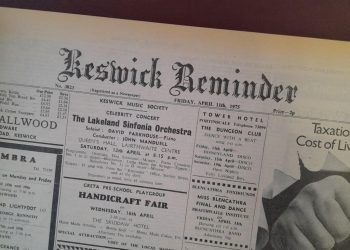
Nobbut Laiking, by Ross Brewster
What was in Caesar’s mind as he made his way to the Forum on that fateful day in 44BC seemed barely relevant compared to events unfolding on 16th October, 1962.
For the life of me I could not comprehend, as a 15-year-old schoolboy, why we were learning Latin verbs while the whole planet stood on a knife edge of nuclear Armageddon. Shouldn’t we be at home with our families during what could be our final hours? Had somebody got their sense of priorities seriously wrong?
It was the Cuban missile crisis when Russia was building nuclear missile sites 140km from the coast of Florida and President Kennedy called Khruschev’s bluff in avoiding what looked like being all-out war.
I don’t recall any of my school friends talking about it. It was so typically British I suppose to just get on with everyday life — and those infernal Latin verbs. But I was scared, I can tell you. I’d just read a remarkably prophetic apocalyptic novel by British author Nevil Shute, On The Beach, which described a world destroyed by nuclear war. A book published in 1952, later made into a film starring Fred Astaire, which could be as relevant in 2024 as it was back then. A dystopian story that could really happen.
While Julius Caesar met his comeuppance, we survived. Back from the brink. For more than 70 years my generation has been lucky. Any wars have been fought in far off lands. We’ve never experienced what it was like in wartime. We saw the end of conscription, the rundown of the military and relative peace.
But here we are again, with dire warnings from the military top brass that, within two or three years, we could be at war with Russia. There is talk of forming volunteer forces, even bringing in conscription for the under 60s. All of a sudden Dad’s Army becomes a modern-day reality, not that a tin hat and kitchen knife strapped to a broom handle would be much use against one of Putin’s horror weapons.
The head of the British Army, General Sir Patrick Sanders, speaks of a “citizens’ army.” Perhaps I should be forming my own pensioners’ pals militia. Once we’ve taken our heart pills, liberally coated arthritic knees with Voltarol, found the right specs and we’ve got a glass for our false teeth, we’d be a match for any invaders.
It’s no joke of course. Recruitment for the army, despite hiring a private company to boost numbers, is one third down on the initial target. They may need the oldies yet. Chief of Defence Staff Admiral Sir Tony Radakin, asks if the machinery and thinking of the British state is truly calibrated to the scale of what is unfolding.
What is he suggesting? That we’d never win another war? That the old wartime spirit is dead? That we aren’t equipped physically and mentally for the struggle that might ensue? Well, certainly the generation that fought the last war is fading away and our political leaders are hardly Churchillian figures.
I fear our children and grandchildren may one day have to go to war. I feel guilt that my generation, as power hungry and selfish as ever, has led us to this grave situation.
Back in the days of the Cold War, the Government put out public service advice on what to do in the event of a nuclear attack. In those vital three seconds before the bomb dropped we were to tape up our windows and build a shelter under the dining room table. In terms of public protection it seems nothing much has changed.
Our church halls may yet fill with Private Godfreys and Sergeant Wilsons, bravely preparing to be our last line of defence. But you won’t find any Captain Mainwarings. The banks have all closed.
The Queen made a big impression
There was a lot more to our late Queen than we all thought.
Her Majesty was a great mimic and could take off numerous accents. Well, she came across plenty in her role and travels as monarch.
Gyles Brandreth, in his podcast, reveals that the Queen was also a great fan of the children’s TV drama Grange Hill. Her party piece was a 10-minute sketch during which she imitated the main characters. The school series ran for 30 series before it ended in 2008 and dealt with several issues such as drug addiction, bullying and teenage pregnancy.
The Queen was fond of doing her sketch when she had posh guests round for dinner. I doubt that many of them were familiar with Tucker, Zammo and Roland, but clapped politely.
Cashing in on unhappiness
More than half the week’s best-selling books in the Sunday Times list have something in common.
They are about health, mental and physical. How to live a healthier life, how to sleep, how to eat well, how to exercise, how to diet and the rest. There are a lot of unhappy people about. Readers who follow every new fad in the hope that their lives will turn out better.
The next book should be How To Make A Fortune Out Of Other People’s Worries And Insecurities.








